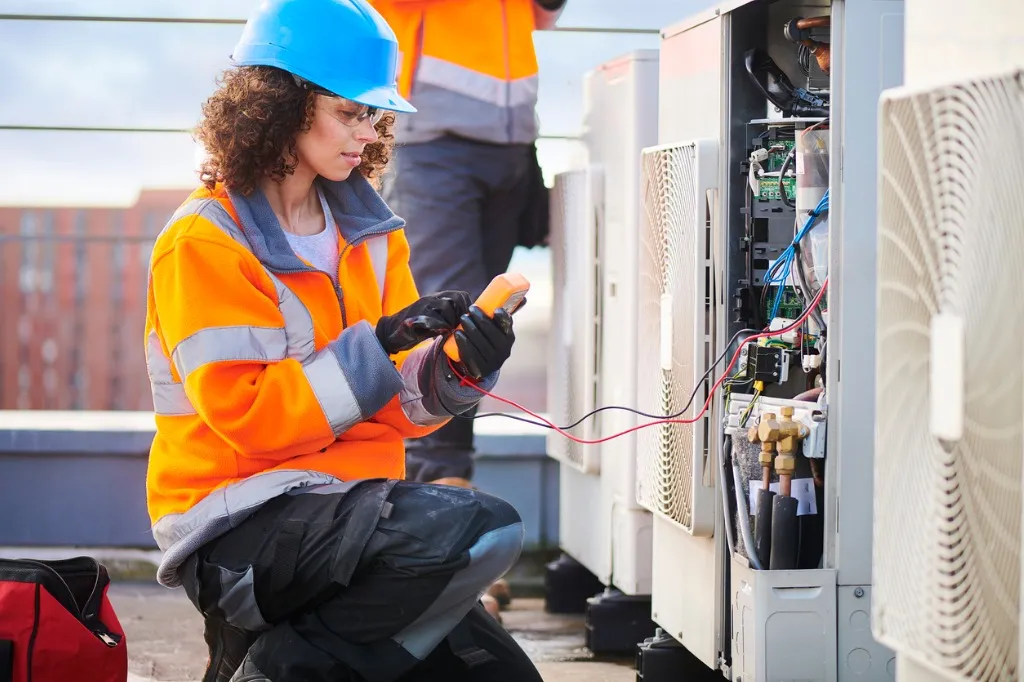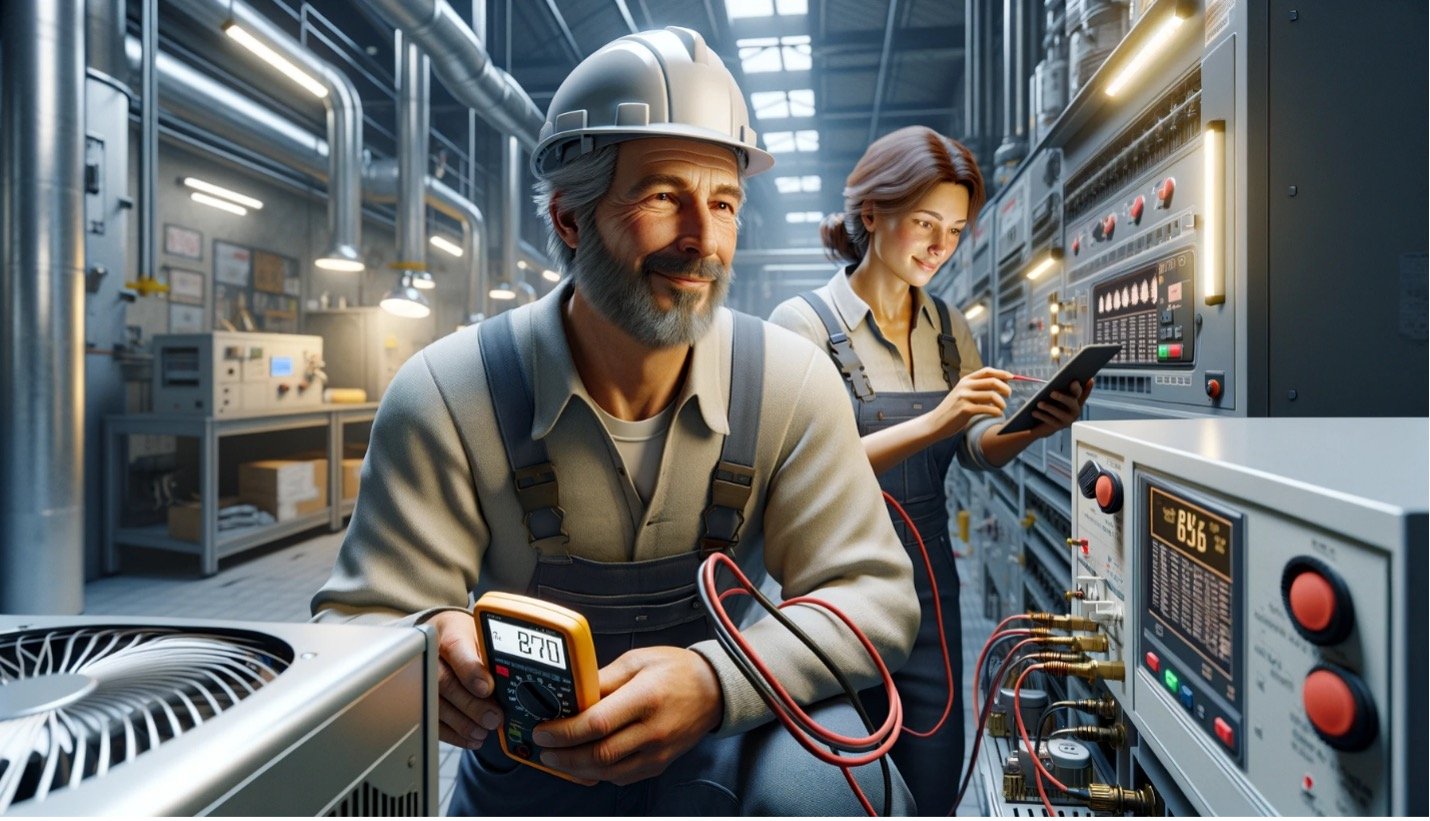An Extensive Look at HVAC Solutions and Their Effect on Energy Effectiveness and Expense Cost Savings
The role of heating and cooling solutions in enhancing energy efficiency and attaining expense financial savings is much more essential than ever, as businesses and homeowners look for sustainable services in an increasingly eco-conscious world. With technical developments like smart thermostats and high-efficiency parts, the capacity for optimizing system efficiency is substantial. Yet, truth effect of these innovations depends mainly on normal maintenance and proactive problem monitoring. As we check out the elaborate connection in between heating and cooling systems and operational costs, including the change towards ecologically friendly alternatives, the question develops: how can these methods be efficiently carried out to optimize both environmental and economic advantages?

Relevance of HVAC Systems
heating and cooling systems are an essential component of contemporary buildings, playing a crucial role in keeping comfortable and healthy and balanced indoor settings. These systems, including ventilation, heating, and air conditioning, are important for managing temperature, moisture, and air quality, thus making certain the well-being of residents. Efficient HVAC systems contribute significantly to creating an optimal indoor environment, which is vital for both business and domestic areas.
In industrial buildings, cooling and heating systems are essential to providing a effective and safe environment. By managing interior climate problems, these systems help avoid the growth of mold and mildew and the spread of air-borne pollutants, therefore guarding the health of workers and consumers. Furthermore, in property setups, heating and cooling systems boost living conditions by using consistent thermal comfort and boosting indoor air quality, which is vital for overall wellness.
In addition, the layout and upkeep of heating and cooling systems have a straight effect on energy consumption and operational costs. Effectively designed and maintained systems can dramatically decrease energy use, resulting in reduced energy bills and a smaller carbon footprint. The efficiency of these systems thus plays a crucial role in advertising sustainability and power preservation within buildings, highlighting their value in the contemporary architectural landscape.
Advances in A/c Innovation
Advancement in HVAC technology is revolutionizing the means structures manage indoor climates, ushering in a brand-new era of performance and control. Recent improvements have actually concentrated on optimizing power usage while enhancing customer comfort. One notable advancement is the integration of smart thermostats, which utilize expert system to discover occupancy patterns and change temperature levels accordingly, minimizing unnecessary power usage.
Variable Cooling Agent Flow (VRF) systems represent one more significant leap onward. These systems allow for accurate temperature control in different areas of a building, improving comfort and lowering energy waste. VRF technology is especially helpful for large business rooms, supplying versatility and scalability.
Additionally, the arrival of Net of Points (IoT) devices has actually transformed heating and cooling systems into interconnected networks efficient in real-time data collection and evaluation. This connectivity enables predictive upkeep, making sure systems operate at peak performance and minimizing unforeseen downtime.
Additionally, advancements in materials and design, such as using high-efficiency coils and compressors, have actually boosted general system efficiency - Heating Contractor. The fostering of eco-friendly refrigerants also emphasizes the market's dedication to sustainability
These technological advancements are crucial in lowering operational costs and environmental influence, setting brand-new standards for constructing climate management.
Heating And Cooling Upkeep and Effectiveness
Ensuring optimal performance of cooling and heating systems prolongs past technical improvements; it likewise depends upon efficient maintenance practices. Routine maintenance is vital for sustaining effectiveness, decreasing power intake, and extending the life expectancy of heating and cooling systems. The key objective is to ensure that all components work at their peak potential, therefore reducing energy waste and maintaining regular interior comfort degrees.
Routine maintenance jobs, such as cleaning or changing air filters, examining refrigerant degrees, and evaluating ductwork for leaks, are important for stopping unneeded pressure on the system. Clogged up or unclean filters can block air movement, creating the system to work more difficult and eat more energy. Likewise, inadequate cooling agent levels can lower cooling performance, leading to higher functional prices.
Furthermore, regular inspections by certified professionals can identify possible problems before they rise right into pricey repair services or system failings. These assessments frequently consist of examining electric connections, adjusting thermostats, and guaranteeing the general integrity of the cooling and heating system. By addressing minor troubles early, companies and property owners can avoid unforeseen failures and enhance power efficiency.
Economical Heating And Cooling Solutions
For those seeking to obtain the most out of their heating, air, and ventilation conditioning systems without damaging the bank, discovering cost-effective heating and cooling options can make a considerable distinction. One instant procedure is to spend in programmable thermostats, which allow users to set specific temperatures for various times of the day, enhancing power usage and decreasing unneeded consumption. By automating temperature modifications, home owners can accomplish significant financial savings on energy expenses.
Normal maintenance is another essential component of economical heating and cooling management. Making sure that filters are cleaned or replaced consistently, ductwork is secured, and units are serviced by professionals can stop costly fixings and enhance system durability. Precautionary maintenance not only keeps system performance but additionally aids in avoiding unexpected failures that can lead to costly emergency repairs.
Additionally, retrofitting existing systems with energy-efficient parts, such as variable speed electric motors or high-efficiency compressors, can be a prudent investment. These upgrades enhance operational performance, lower power use, and can often be description applied at a fraction of the cost of a full system replacement.
Ecological Effect Decrease
Reducing the environmental influence of Heating and cooling systems is vital in today's pursuit of lasting living. A/c systems are substantial contributors to energy intake, accounting for nearly 40% of power use in industrial structures.
Technical advancements in heating and cooling design and procedure, including the combination of wise thermostats and energy-efficient warm pumps, are essential in lowering carbon impacts. These advancements enable optimized energy usage, lessening wastage and boosting overall system efficiency. Furthermore, adopting regular upkeep practices makes certain HVAC systems run at peak effectiveness, additional stopping unnecessary power intake.
Additionally, using eco pleasant cooling agents is critical, as standard refrigerants, like CFCs and HCFCs, have been eliminated as a result of their ozone-depleting properties. Modern options, such as hydrofluoroolefins (HFOs), offer reduced ecological dangers, straightening with worldwide environmental protocols. By welcoming these sustainable practices, HVAC solutions can play a transformative duty in reducing ecological effects, promoting energy performance, and fostering a more sustainable future.
Final Thought

Furthermore, the design and upkeep of Cooling and heating systems have a straight influence on energy intake and functional costs. Regular maintenance is essential for sustaining important link efficiency, minimizing power intake, and prolonging the life period of Cooling and heating systems. A/c systems are significant contributors to energy consumption, accounting for virtually 40% of power usage in business buildings. In addition, taking on regular maintenance methods makes sure Heating and cooling systems run at peak performance, more curtailing unneeded power intake.
The shift to environmentally friendly Cooling and heating systems further reduces operational prices and promotes sustainability. (Heating Contractor)